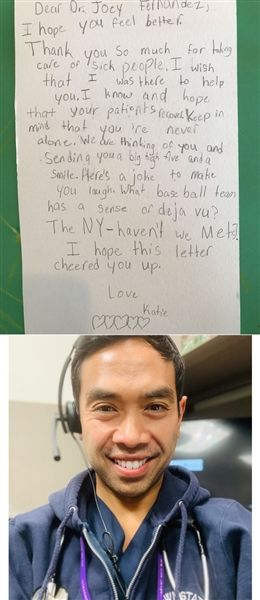

Third Graders Send Letters of Thanks to NYC Doctor
Source/Author: Khana Rebman, Third Grade Teacher
April 16, 2020
Third graders in Mrs. Rebman’s class had the opportunity to send letters to Dr. Joey Fernandez, a New York City doctor working with COVID-19 patients, who is friends with a family in the class.
“Mrs. Eichenbaum expressed to me how distressed Dr. Fernandez was from all he's seen and having to go through, and she asked if we could write letters to him to offer encouragement, support and boost his morale.” Mrs. Rebman explained.
The students wrote letters the next day, and Mrs. Rebman shared that she was tearing up as she was reading them. Some were shared on Google Drive so they could arrive immediately.
Every Friday, the classmates share with each other how they've made an impact according to the social justice standards that they follow. These letters were a common theme last Friday on how they felt they made an impact that week.
“They said it felt really good to write a letter and to know that someone needs their support.” Mrs. Rebman added. “I love how they asked questions and he was so thorough in responding back to them.”
Some excerpt from the students’ letters include:
“You are a hero, you are saving so many lives! Thank you for working so hard to help people who are sick with COVID-19. I know that it must be scary to be around sick people every day. I hope that you are taking good care of yourself. I hope you get to see your family everyday after work. My family and I have been staying home since March 14th so that we can help others not get sick. My ENTIRE family including my grandparents and my cousins are staying home also. Right now any nurse or doctor is a superstar. You got this!”
“The way you are treating your patients and treating the sick is so caring. You are being changemakers right now! You are definitely the most important people right now! Have you been getting to see your families? Have you been able to get enough sleep? If not I bet that would be very hard.”
“Thank you for taking care of people in need. And it is very brave of you to do this. And I know you have no choice and the virus is very scary. And if it wasn't for people like you this vires would go on forever. And if you and other people take care of this like you it will be over soon. And you have to work all day for people in need and at the same time you could be with your family but instead you help people in need.”
“Being a Doctor who is helping with people suffering from coronavirus is hard but you are making those people happy. I know you’re dealing with a lot but you are helping so much. Keep on being compassionate towards others with coronavirus, and keep up the good work. I love you.”
“It's cool how you dedicate your life to help people. I love how you think of ways to help covid 19 stop. It's cool how you are a doctor. I'd like to be a doctor too. What do you do? How hard is it to be a doctor? I think you may have inspired some people and me! My life is better now.”
You can read much of Dr. Fernandez’s response below:
Dear Mrs. Rebman, Anabella, Carter, Chloe, Elliot, Freyda, Katie, Kip, Lexie, Miles, Morgan, Paige, Rylan, Sabi, and Zoe,
When I received your letters last week I felt overwhelming emotion because of how much you moved me. I wanted to write back to let you know just how much those letters meant to me in these challenging times. I am incredibly grateful and thank you for your well wishes. I will try to explain my experience with you all. I have not collected my thoughts on this in writing before, but I wanted to do it for you because of just how much your letters came at the right time and helped motivate me even more to continue helping people suffering from this terrible disease and sadness.
First, I want to stress how much I am like you, and you all have the capacity to do something like this. Zoe can tell you that I am no different from you. When Uncles (that’s me and my husband, Nick) visit the Eichenbaums our favorite things to do are to dance, sing, make art, tell jokes, swim, play games, imagine and pretend. We have lots of fun! Zoe and I particularly have fun doing “dance pics” by posing next to statues or buildings in splits, backbends, or arabesques. The Eichenbaums and Uncles were going to reunite in New York City this month, but the trip was canceled for everyone’s safety. I miss them, and, like you, would much prefer to be out of our current situation. While we are in it, however, many people need help, and I am trying to do what I can. And you are too—your letters helped me.
Ok, time for your questions. But first a joke you wrote that made me laugh and smile:
What baseball team has a sense of déjà vu?
The New York haven’t-we-Mets
What do you do?
I am a primary care physician specializing in sports medicine in New York City. I typically take care of college dancers, athletes, and students in a clinic, but I am currently volunteering at the hospital on one of the COVID-19 wards because of our current health crisis.
How hard is it to be a doctor?
It can be challenging, but easier to handle when I channel my energy into a singular mission: heal, protect, and save lives. The impact a doctor can have on someone’s life makes any challenges in doing the job worthwhile.
What is it like at the hospital?
Stressful. During my training I worked in a hospital, but I did my training 12 years ago. Even though I may treat some of the same underlying health conditions I see in the hospital (such as pneumonia and asthma) in my usual clinic, patients in the hospital often can be experiencing more severe symptoms, which requires a different approach to treatment that you learn and keep up-to-date on only by working in the hospital. So it’s a big challenge to do that when I have not done it in so long. There are many nurses and doctors from all different departments and disciplines that have been called to act in this COVID army—it’s “all hands on deck” and everyone has been asked to help navigate the storm. I have even met volunteers from different states, like Kansas and Texas, that have joined our healthcare team in New York. The needs of the hospitals, patients, families, and healthcare workers are great. We are all doing our best to work together to fight this disease, and the camaraderie is high.
The hospital is divided into 4 main areas at the moment: the Emergency Room, the COVID Acute Care Wards, the COVID Intensive Care Units, and the COVID Step Down Wards. The Emergency Room sees people who just arrive at the hospital and either treats them or determines if they have to be admitted. If they have COVID and need to be admitted, where they go depends on the severity of their symptoms. Those with the most severe symptoms (such as those who need a machine -a ventilator- to breathe for them) will go to Intensive Care. Those with slightly less severe symptoms will go to Acute Care. And those who require hospitalization but have less severe symptoms (who may, for example, need an oxygen mask and medication but who otherwise seem stable at the moment) go to Step Down.
I am fortunate to work on one of the Step Down units where patients tend to be more stable, however there are very sick patients across the hospital. In contrast to the alarms, intense conversations, noisy HEPA filters, and movement in the patient care areas, the lobbies, halls, courtyards, and the cafeteria are pretty quiet, and they offer moments of peace although also seem eerily still relative to how you would normally find them. You may know that no visitors are allowed in the hospital, and that many of the students, professors, and scientists that are normally here are now working from home. All hospital workers are asked to wear masks at all times and try to stand 6 feet apart. This is often difficult for us, but not impossible. There is a heightened sense of everything: Light, dark, grief, relief, togetherness, and isolation.
One of the most difficult things right now is the absence of visitors. Patients are struggling with a serious illness, and having family by their side would be a huge emotional support for them. But this disease is so contagious and deadly that the hospital cannot allow visitors. I try to be the emotional support my patients need, and they also stay in touch with their families over the phone.
How many people did you save at the hospital?
I don’t know exactly. It’s not that easy to explain. I work with 4 other doctors on my particular unit and we all help each other. There is so much we still don’t understand about this virus, and so we also need to enlist and collaborate with other doctors, pharmacists, and nurses, and our patients’ families, too. It takes all of us to save patients.
One thing that has been moving to experience is how New York City as a whole has rallied around healthcare workers. In the evenings, at 7pm, New Yorkers have been cheering from their windows and balconies for the City’s healthcare workers. You can hear it all over the City. I was fortunate to leave the hospital at 7pm the other day and was touched to witness what happens immediately outside. Police applaud on horses. Fire engines honk and flash, and firefighters cheer. Nurses and doctors pour out of the emergency room and stand by ambulances, EMTs, and drivers in solidarity. Looking up, people wave from their apartment buildings. Someone plays a cowbell. It is exactly the type of thing like your letters—it lets you know that, in the midst of this, we are all in it together, support each other, and will get through this.
Is it scary to be around so many sick people?
Yes, of course. But it is not an unfamiliar feeling. Every day doctors and nurses help patients with all sorts of conditions, diseases, injuries, and infections. In this particular time, however, we are being more cautious.
Do you have enough equipment to stay safe?
Yes, I think so. We have changed some procedures we followed before because of the lack of equipment (such as using a single mask per patient encounter), but I believe our current procedures are safe and we do have enough equipment for them. There is still more to be learned about how the virus is spread, so the way we protect ourselves in the various units is slightly different, and the procedures and resources are evolving.
Have you been getting to see your families?
I live in an apartment in Manhattan with my husband Nick, and seeing him is my favorite part of every day. We have not been able to see our families or friends for over a month, but we FaceTime a lot and cannot wait for this to be over to see them again.
Have you been able to get enough sleep?
Here and there, yes. I’m not a very good sleeper to begin with, and sometimes being anxious interrupts the night. Something that you learn quickly in hospital work is to eat and sleep when you can.
What can I do to help? What can I do to stay safe?
You’ve done it already, but stay consistent. Stay home. Wash your hands. Avoid touching your eyes, nose, and mouth. Be patient. Be good to your parents, teachers, and caregivers who are taking on many roles at once. Be creative. Read books. Send your extended family drawings to brighten their day.
Thank you again, class, for your letters and questions, and for helping me through this.
Warm and hopeful wishes,
Dr. Fernandez
Joey C. Fernandez, MD
Dr. Joey
Uncle Joey
























